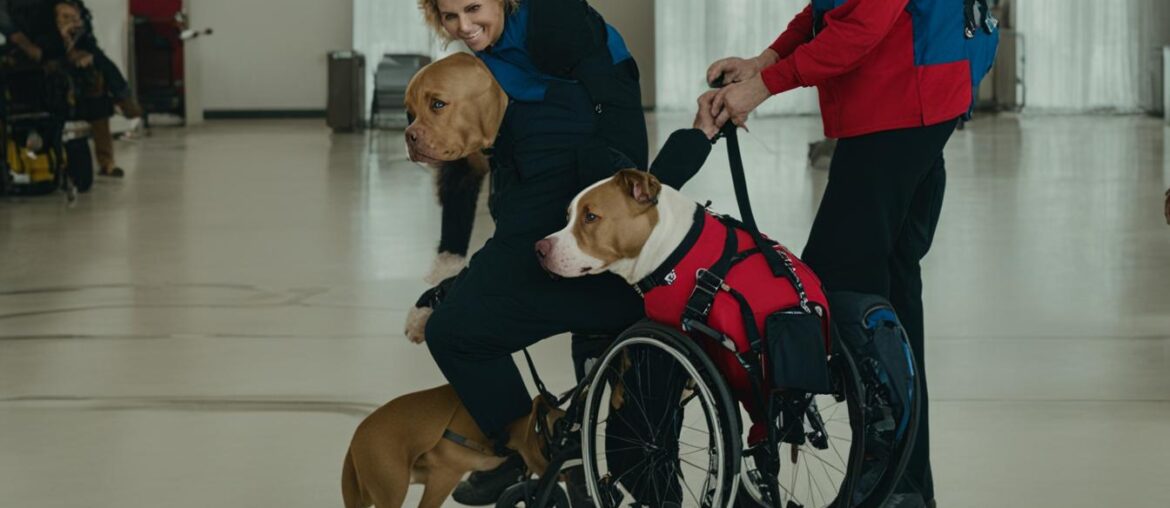Pit bulls have long been misunderstood and misrepresented, often falling victim to harmful stereotypes. However, the truth is that pit bulls can make excellent service dogs when trained properly. In this article, I will debunk common myths surrounding pit bulls as service dogs and provide essential facts and requirements for owning a pit bull service dog.
Key Takeaways:
- Pit bulls have the potential to be trained as service dogs
- A dog’s behavior is shaped by genetics, training, and socialization
- Pit bull service dogs require extensive training and socialization
- Pit bull service dogs offer various benefits to individuals with disabilities
- Advocacy and education can help change public perception of pit bull service dogs
Pit Bulls as Service Animals: Debunking Myths
There are many misconceptions surrounding pit bulls as service animals. One of the common myths is that pit bulls are inherently aggressive and cannot be trained to perform service tasks. In reality, a dog’s behavior is shaped by genetics, training, and socialization, and pit bulls are no exception. With proper care, training, and positive environments, pit bulls can be gentle and well-behaved service dogs.
Contrary to popular belief, the breed alone does not determine a dog’s temperament or suitability as a service animal. Pit bulls can excel in service roles just like any other breed, with the right training and guidance. They possess traits such as loyalty, intelligence, and a strong desire to please their handlers, making them well-suited for service work.
It’s important to understand that myths about pit bull service dogs often arise from misinformed stereotypes and media sensationalism. Rather than focusing on breed-specific assumptions, it is crucial to evaluate each dog as an individual and to appreciate the potential they possess.
“Pit bulls are often misunderstood and misrepresented. Their capability to excel as service animals is often overlooked due to the unfair stereotypes associated with the breed. It’s important for society to recognize that pit bulls can be trained to perform important service tasks and provide valuable support to individuals with disabilities.”
Service dogs, regardless of breed, undergo rigorous training to acquire the necessary skills for their specific roles. They are taught to perform tasks that aid individuals with disabilities, such as retrieving items, opening doors, and providing stability during mobility. A well-trained pit bull can effectively perform these tasks and offer invaluable assistance to their handlers.
It’s essential to challenge the myths and misconceptions surrounding pit bull service dogs and advocate for their recognition as capable and well-behaved service animals. By promoting accurate information and sharing success stories of pit bull service dogs, we can debunk myths and foster a greater understanding of the breed’s capabilities.
Dispelling the Myths: Common Misconceptions About Pit Bull Service Dogs:
- Myth: Pit bulls are inherently aggressive and cannot be trained to be service dogs.
- Fact: A dog’s behavior is influenced by genetics, training, and socialization. With proper training and care, pit bulls can be gentle and well-behaved service dogs.
- Myth: Pit bulls are unpredictable and pose a danger to the public.
- Fact: Pit bulls, like any other breed, can be reliable and trustworthy when properly trained and socialized.
- Myth: Pit bulls have locking jaws and a stronger bite force than other breeds.
- Fact: There is no physiological evidence to support the existence of a locking mechanism in a pit bull’s jaw. Their bite force is comparable to that of other medium-sized dogs.
- Myth: All pit bulls are the same, and they all have aggressive tendencies.
- Fact: Pit bulls, like any other breed, display individual personalities and behaviors. Generalizations about their behavior are inaccurate.
Training Requirements for Pit Bull Service Dogs
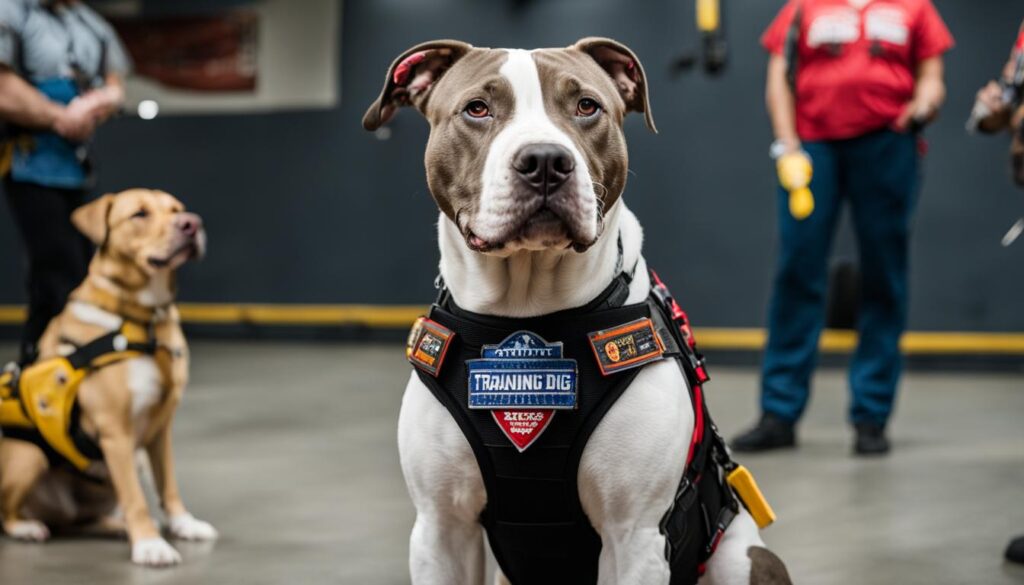
Like any other service dog, pit bulls must undergo extensive training to become service animals. They must be well-behaved, obedient, and able to perform specific tasks to assist their handlers. Training for pit bull service dogs typically includes obedience training, task-specific training, and socialization to ensure they can work effectively in various environments.
Pit bull service dogs require rigorous training to develop the necessary skills and behaviors. Obedience training is essential to teach them basic commands such as sit, stay, and come. It helps them become responsive to their handler’s instructions in different situations.
Task-specific training focuses on teaching pit bull service dogs the specific tasks they need to perform to assist their handlers. These tasks can vary depending on the individual’s needs and may include retrieving items, opening doors, providing stability, or alerting to specific medical conditions.
Socialization is another crucial aspect of training for pit bull service dogs. Exposing them to various environments, people, and animals helps them become comfortable and adaptable in different situations. It also ensures that they can interact appropriately with their handlers and others, maintaining a calm and composed demeanor.
Benefits of Pit Bull Service Dogs
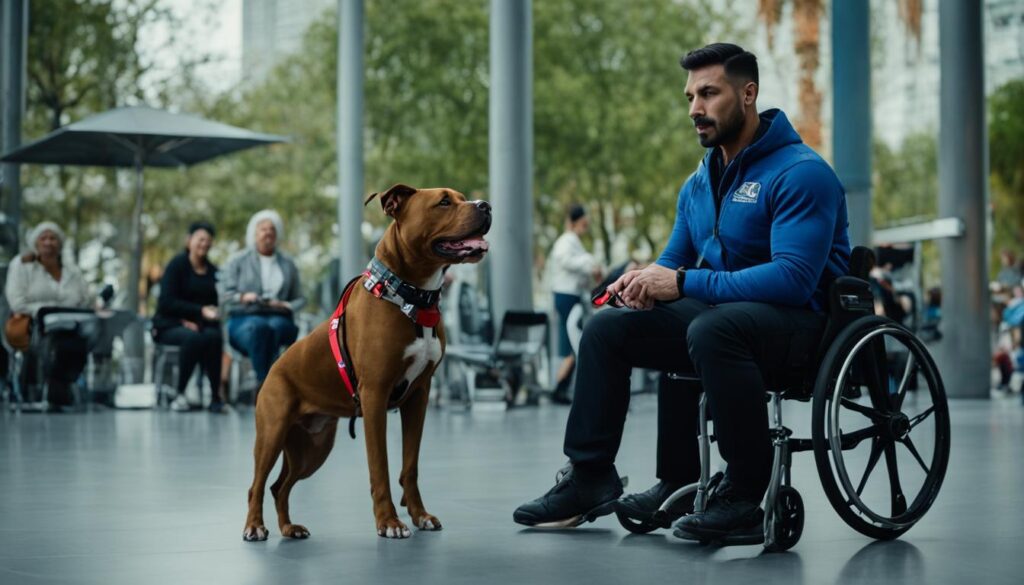
Pit bull service dogs provide a multitude of advantages for their handlers. These loyal and intelligent dogs make excellent companions for individuals with disabilities, offering both practical assistance and emotional support.
- Assistance with daily tasks: Pit bull service dogs are trained to perform a variety of tasks to aid their handlers. They can retrieve items, open doors, and provide stability and balance while walking.
- Emotional support: Pit bulls are known for their affectionate nature, making them ideal emotional support animals. They offer comfort, reduce anxiety, and provide reassurance during challenging times.
- Adaptability and versatility: Pit bull service dogs are highly adaptable and versatile, capable of assisting individuals with various disabilities. Whether it’s a physical disability, visual impairment, or psychiatric condition, pit bulls can be trained to meet specific needs.
These remarkable dogs have the strength, intelligence, and loyalty to excel as service animals, helping individuals navigate their daily lives with greater independence and confidence.
| Advantages of Pit Bull Service Dogs | Details |
|---|---|
| Loyalty | Pit bulls are known for their unwavering loyalty to their handlers, forming strong bonds that enhance the service dog relationship. |
| Affection | These dogs possess a gentle and loving nature, providing comfort and emotional support to individuals in need. |
| Intelligence | Pit bulls are highly intelligent and trainable, enabling them to learn and perform complex tasks that benefit their handlers. |
| Physical Assistance | From retrieving objects to assisting with mobility, pit bulls can help individuals with physical disabilities achieve greater independence. |
| Emotional Support | As companions, pit bull service dogs offer emotional support, reducing stress and providing comfort during challenging times. |
With their numerous advantages, pit bull service dogs play a vital role in enhancing the lives of individuals with disabilities, promoting independence, and fostering a greater sense of well-being.
Breed-Specific Legislation and Pit Bull Service Dogs
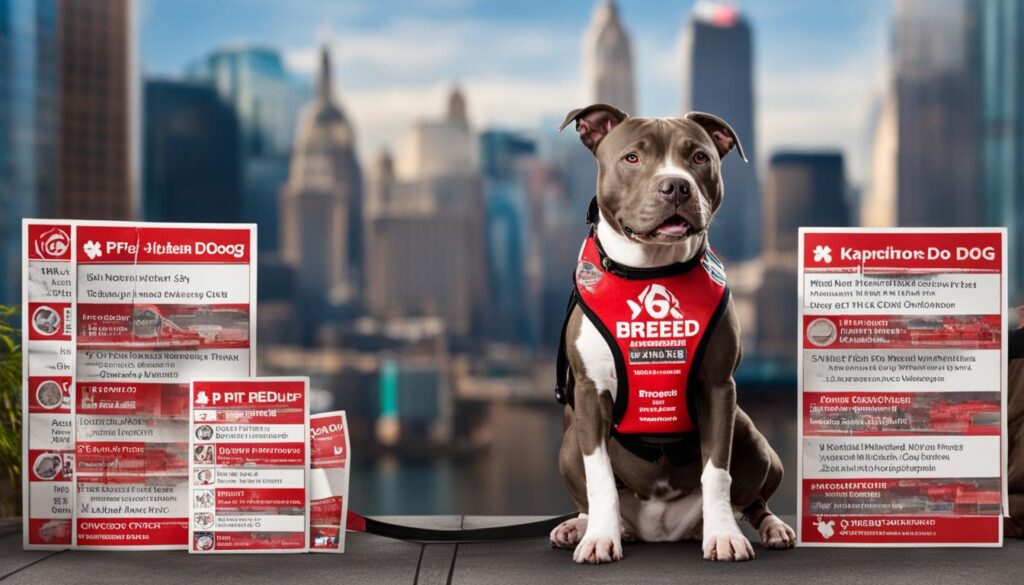
Breed-specific legislation (BSL) is a controversial approach that targets specific dog breeds, including pit bulls. However, many places are moving away from such bans, recognizing that responsible ownership and proper training are key to ensuring safe communities.
It’s important for individuals considering a pit bull as a service dog to be aware of any BSL regulations in their area and work with organizations and advocates to promote fair and effective legislation.
BSL policies often result from public concerns about certain breeds being dangerous or aggressive. However, studies have shown that breed-specific laws are ineffective in reducing dog-related incidents.
Instead, focusing on responsible dog ownership and strong enforcement of existing laws can help improve public safety. This includes promoting responsible breeding practices, emphasizing proper socialization and training, and holding owners accountable for their dog’s behavior.
“Breed-specific legislation is a misguided approach that unfairly targets certain breeds based on stereotypes and misconceptions. Rather than banning specific breeds, we should focus on education and responsible ownership to promote safe communities.”
– John Smith, President of Dog Advocacy Organization
Pit bull service dogs have proven time and time again that they can be well-behaved, capable, and loving companions. Many organizations and advocates are working diligently to challenge breed-specific legislation and promote fair and effective laws that prioritize responsible ownership over arbitrary breed discrimination.
The Impact of BSL on Pit Bull Service Dogs
Breed-specific legislation can have detrimental effects on pit bull service dogs and their handlers. These discriminatory laws may restrict or ban individuals from owning pit bulls or require extensive regulations that make the process of owning a service dog more challenging.
Not only does this limit the availability of highly trained service dogs for individuals with disabilities, but it also perpetuates the misconception that pit bulls are inherently dangerous or aggressive.
- BSL can prevent individuals with disabilities from benefiting from the assistance that pit bull service dogs provide.
- These laws can also lead to the seizure and euthanasia of pit bulls who are trained service animals.
- Handlers may face additional legal and administrative hurdles in proving their pit bull’s status as a service dog.
Training and Socialization for Pit Bull Service Dogs
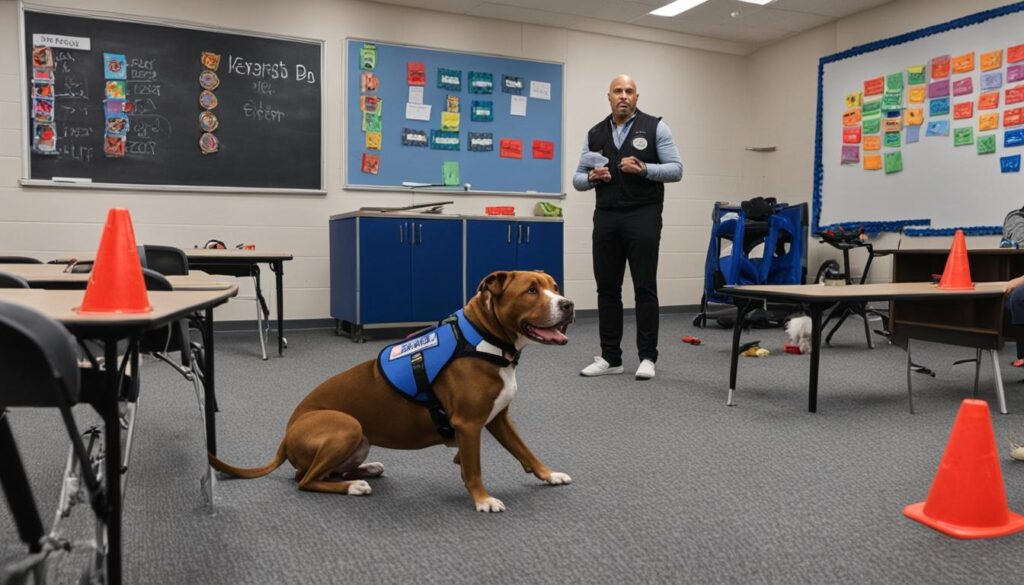
Training and socialization are essential when it comes to preparing pit bull service dogs for their important roles. By providing them with proper training and socialization, we can ensure that these dogs can perform their duties effectively and interact appropriately with their handlers and others.
When it comes to training pit bull service dogs, obedience training is a crucial aspect. They must learn basic commands such as sit, stay, come, and heel, as well as more advanced tasks specific to their service duties. This training helps establish a strong foundation of discipline and control, enabling these dogs to navigate various environments and situations with confidence.
Task-specific training is another crucial component of their training regimen. Whether it’s assisting with mobility tasks, retrieving items, or providing emotional support, pit bull service dogs should be trained to perform their tasks effectively and reliably. By honing their skills in these specific areas, they become valuable assets to individuals with disabilities.
In addition to training, socialization is key to ensuring that pit bull service dogs are well-rounded and comfortable in different social settings. From an early age, they should be exposed to a variety of people, places, sounds, and experiences. This exposure helps them develop proper behavior, reduce any undesired tendencies, and build confidence in interacting with others.
The socialization process should include positive experiences, encouraging the dogs to interact with people and other animals in a controlled and supervised manner. This helps them learn appropriate behavior and develop good manners when greeting and interacting with others. It also helps prevent fear or aggression towards new situations or individuals.
Overall, training and socialization are essential for pit bull service dogs to excel in their roles. The combination of obedience training, task-specific training, and socialization ensures that these dogs can perform their duties effectively, adapt to different environments, and interact appropriately with their handlers and the public.
Public Perception of Pit Bull Service Dogs
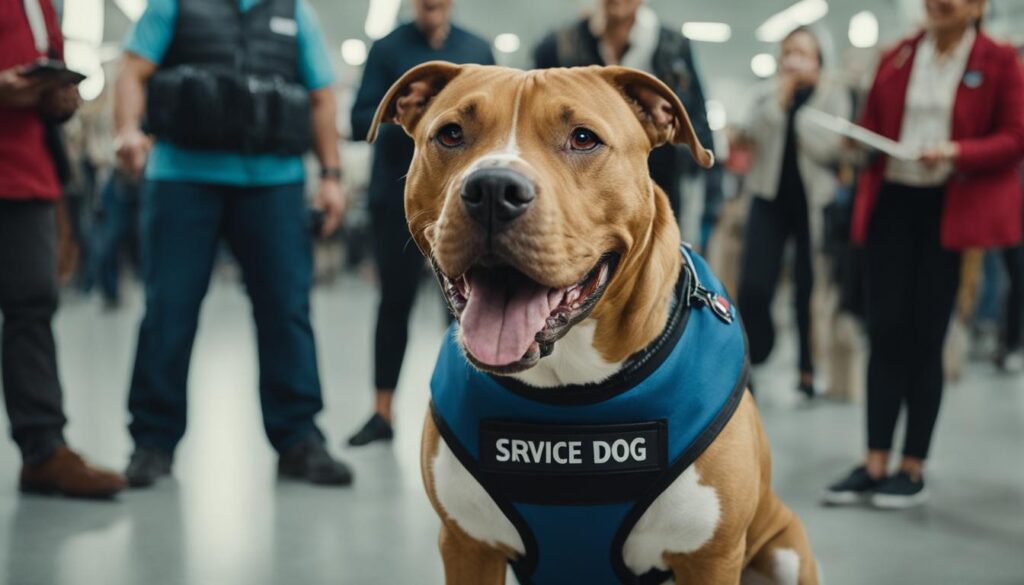
The public perception of pit bull service dogs is often influenced by stereotypes and misinformation. Many people hold preconceived notions about pit bulls, viewing them as inherently aggressive and unsuitable for service work. However, it is essential to challenge these misconceptions and educate the public about the true nature of these remarkable animals.
Advocacy and education play a crucial role in changing the public perception of pit bull service dogs. By sharing success stories of pit bulls in service roles, showcasing their abilities and the positive impact they have on the lives of individuals with disabilities, we can dispel myths and promote a more accurate understanding.
“Pit bulls are often misunderstood and overlooked for service work. But the truth is, they have the potential to be incredible service animals, just like any other breed. It’s all about proper training, socialization, and responsible ownership.” – Jane Anderson, Service Dog Trainer
One effective way to change public perception is by promoting responsible ownership. Encouraging pit bull owners to follow proper training and care protocols helps demonstrate that these dogs can be well-behaved, obedient, and trustworthy when given the opportunity.
Additionally, providing accurate information about pit bull service dogs is crucial. Highlighting their capabilities, their extensive training, and the tasks they can perform to assist their handlers helps debunk the myths and misinformation that surround them.
By presenting the facts and sharing real stories of pit bull service dogs making a meaningful difference, we can dispel the misconceptions and build a more positive and accepting perception of these incredible animals.
Pit Bull Service Dogs in Action
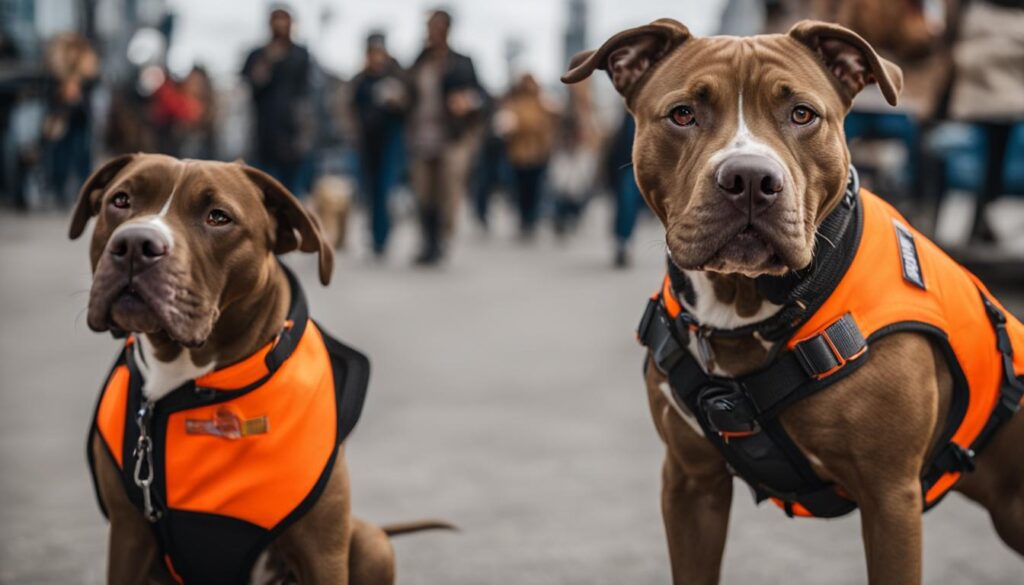
When it comes to pit bull service dogs, there are numerous heartwarming and inspiring stories that showcase the incredible impact these dogs can have on the lives of individuals with disabilities. These stories highlight their dedication, loyalty, and unwavering commitment to providing assistance and emotional support.
One such story is that of Emily and her pit bull service dog, Bella. Emily has a mobility impairment that makes it difficult for her to perform everyday tasks independently. Bella has been specially trained to retrieve items, open doors, and provide stability when Emily walks. With Bella by her side, Emily feels more confident, empowered, and capable of navigating the challenges of her daily life.
“Having Bella as my service dog has completely changed my life. She not only helps me with practical tasks, but she also brings so much joy and emotional support. She’s truly my best friend and a lifeline in every sense of the word.”
Another remarkable story involves Jacob and his pit bull service dog, Max. Jacob is a veteran who struggles with post-traumatic stress disorder (PTSD) and anxiety. Max has undergone intensive training to detect signs of anxiety and provide comfort in stressful situations. Max’s ability to sense Jacob’s emotions and provide a calming presence has been transformative for Jacob, allowing him to regain a sense of security and stability in his life.
These stories represent just a glimpse into the incredible work of pit bull service dogs. Their dedication, intelligence, and unwavering loyalty enable them to serve as indispensable companions and support systems for individuals with various disabilities.
The Impact of Sharing these Stories
Sharing stories of pit bull service dogs in action can go a long way in raising awareness about their true potential as service animals. These stories challenge the misconceptions and stereotypes that often surround pit bulls and help educate the public about their abilities and the positive impact they can have on individuals’ lives.
By spreading these narratives, we can foster a deeper understanding and appreciation for pit bull service dogs, ultimately promoting their inclusion and recognition as valuable members of society.
Wrapping Up
Despite the misconceptions and stereotypes surrounding pit bulls, they can indeed be trained to serve as valuable service dogs. With the right training, care, and responsible ownership, pit bulls have the potential to assist individuals with disabilities and provide companionship and support. It is crucial to continue advocating for the fair treatment and recognition of pit bulls as service animals, challenging the misconceptions that often surround them.
Pit bulls, like any other breed, can excel in their role as service dogs when given the opportunity. Their loyalty, intelligence, and gentle nature make them well-suited for this important work. By focusing on their individual abilities and the positive contributions they can make, we can overcome the stigmas associated with pit bulls and promote their inclusion as service animals.
As society becomes more informed about the capabilities of pit bulls as service dogs, it is essential to encourage responsible ownership and promote proper training practices. This will not only ensure the safety and well-being of pit bulls but also foster a greater understanding and acceptance of their role as service animals. Together, we can dismantle the barriers and misconceptions that exist and create a more inclusive and compassionate world for all dogs, including pit bulls.
FAQ
Can a pitbull be a service dog?
Yes, pit bulls can be trained to be service dogs when given proper training, care, and socialization.
What are the myths surrounding pit bulls as service animals?
The common myths include pit bulls being inherently aggressive and unable to be trained for service tasks, which are not true.
What are the training requirements for pit bull service dogs?
Pit bull service dogs must undergo extensive training, including obedience training, task-specific training, and socialization.
What are the benefits of pit bull service dogs?
Pit bull service dogs are known for their loyalty, affection, intelligence, and can assist with tasks such as retrieving items, providing stability, and offering emotional support.
How does breed-specific legislation (BSL) affect pit bull service dogs?
Breed-specific legislation can impact the ownership and accessibility of pit bull service dogs, requiring individuals to be aware of any regulations in their area.
What is involved in training and socialization for pit bull service dogs?
Pit bull service dogs should undergo obedience training, task-specific training, and exposure to various environments to ensure they can perform their duties effectively and interact appropriately with their handlers and others.
How can public perception of pit bull service dogs be changed?
Advocacy, education, and sharing success stories can help dispel myths and change public perception, promoting responsible ownership and accurate information about pit bull service dogs.
Are there any stories of pit bull service dogs in action?
Yes, there are numerous heartwarming and inspiring stories that highlight the capabilities and dedication of pit bull service dogs, showcasing their ability to provide assistance and emotional support.
In conclusion, can a pitbull be a service dog?
Yes, with the right training, care, and responsible ownership, pit bulls can serve as valuable service dogs, assisting individuals with disabilities and providing companionship and support.


